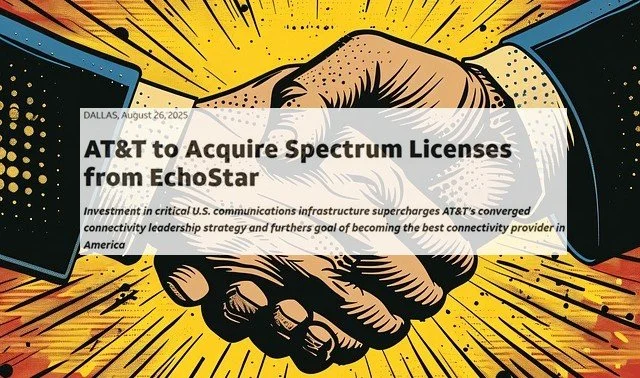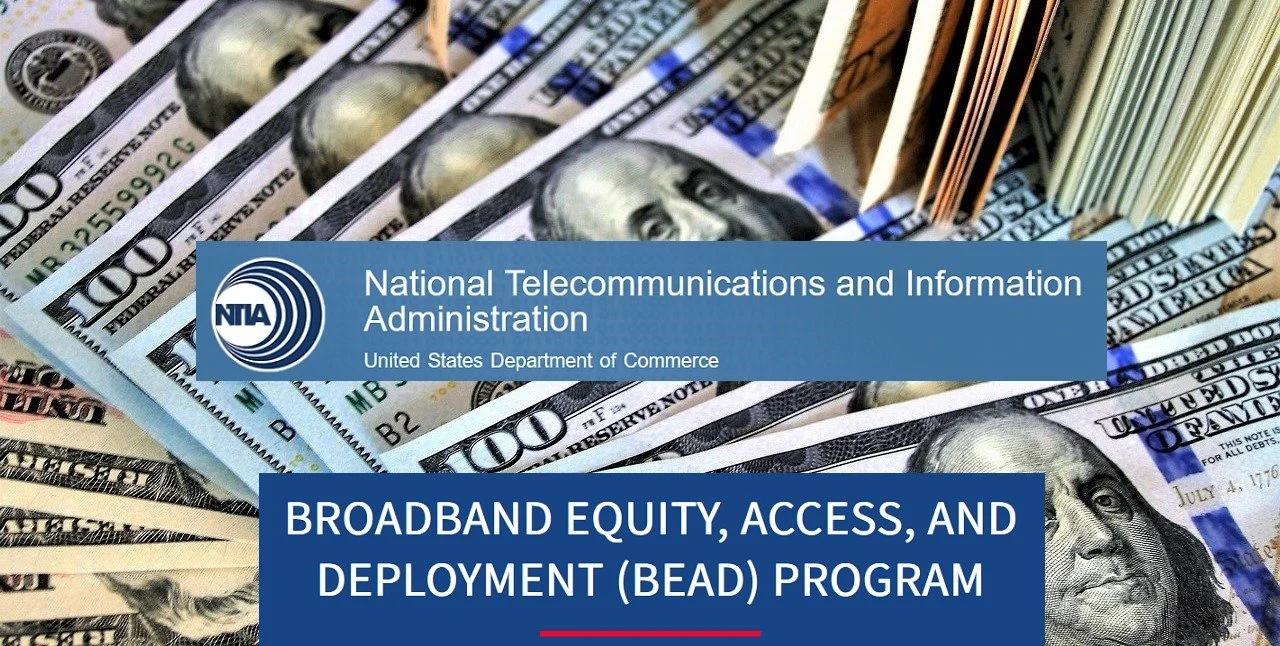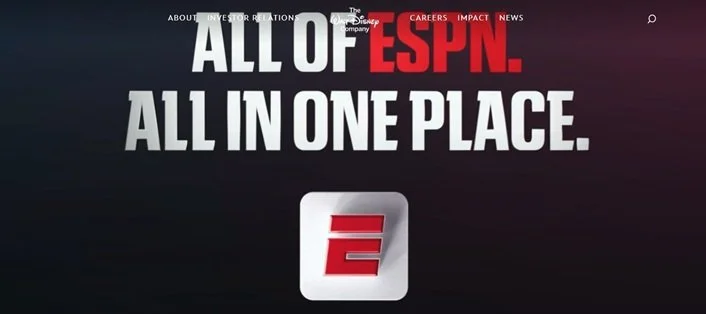News Update - FCC-Broadband-Telecom - August 2025
AT&T Purchasing EchoStar Spectrum Licenses For $23 Billion
August 26, 2025 – AT&T has announced it is purchasing spectrum licenses from EchoStar for roughly $23 billion. Specifically, “AT&T will acquire approximately 30 MHz of nationwide 3.45 GHz mid-band spectrum and approximately 20 MHz of nationwide 600 MHz low-band spectrum for approximately $23 billion in an all-cash transaction, subject to certain adjustments.” EchoStar’s spectrum licenses cover virtually every market across the U.S. – over 400 markets in total. Also, AT&T and EchoStar have agreed to enhance their long-term wholesale network services agreement, under which EchoStar will operate as a hybrid mobile network operator (MNO) with AT&T as the primary network services partner. In the press release announcing the deal, AT&T lists the following as key details of the transaction:
$23 billion acquisition will add an average of approximately 50 MHz of low-band and mid-band spectrum to AT&T’s holdings – covering virtually every market across the U.S. and positioning AT&T to maintain long-term leadership in advanced connectivity across 5G and fiber
Transaction powers improved and capital-efficient long-term growth by accelerating the Company’s ability to add converged subscribers with both 5G wireless and home internet services in more places
Leading AT&T network will enable continued EchoStar participation in wireless industry through long-term wholesale network services agreement
AT&T reiterates full-year 2025 financial guidance and capital return plans including an expected $20 billion of share repurchase capacity during 2025-2027
AT&T intends to begin deploying these mid-band licenses, which are compatible with its 5G network, as soon as possible
The transaction is expected to close in mid-2026, subject to certain closing conditions, including regulatory approvals
AT&T’s acquisition of EchoStar’s spectrum means the U.S. mobile wireless industry is essentially made up of the big three – T-Mobile, Verizon, and AT&T – and brings an end to regulatory efforts to have four nationwide carriers. In 2019, the U.S. Department of Justice reached a settlement with T-Mobile and Sprint, allowing the two mobile wireless providers to complete their merger. To help facilitate the settlement, DISH Network was added as a defendant to the action and (Proposed) Final Judgment, and T-Mobile and Sprint were required to divest spectrum, prepaid wireless businesses, cell sites, and physical assets to DISH. The merger of T-Mobile and Sprint shrunk the mobile wireless industry from four to three nationwide carriers, but the terms of the DOJ’s settlement propped up DISH as a new fourth nationwide mobile wireless carrier. In late 2023, EchoStar Corporation acquired DISH Network Corporation.
Mergers & Acquisitions: Private Equity Firm GTCR Acquires Innovative Systems
August 26, 2025 – Private equity firm GTCR LLC has announced that it has acquired Innovative Systems, an enterprise software company that primarily serves broadband providers, utilities, cooperatives, and municipalities across the U.S. GTCR is a Chicago-based private equity firm with investments in financial services and financial technology companies, healthcare, technology, media and telecommunications businesses, and business and consumer services. Innovative Systems, founded in 1998, is headquartered in Mitchell, South Dakota. The following information was included in the press release announcing the deal:
“GTCR, a leading private equity firm, announced today that it has acquired Innovative Systems (the “Company”), a leading platform of mission-critical enterprise software serving regional broadband providers nationwide, from Alpine Investors, a people-driven private equity firm. As part of the Leaders Strategy™ investment approach, GTCR is partnering with experienced technology executive Scott Alcott, who has joined the Company as CEO to lead Innovative Systems through its next phase of growth.
Founded in 1998 and headquartered in Mitchell, South Dakota, Innovative Systems provides an integrated suite of mission-critical operating and billing software systems (“OSS/BSS”) capabilities as well as payments and bill processing. Innovative Systems’ platform creates a seamless, end-to-end operational and billing experience that eliminates the cost and complexity associated with integrating and maintaining disconnected point solutions. The Company delivers a comprehensive offering and high quality, 24/7 customer service to broadband service providers, utilities, cooperatives and municipalities across the U.S.”
New Mexico Announces BEAD Awards
August 26, 2025 – New Mexico’s Office of Broadband Access and Expansion’s (OBAE) has announced the preliminary selection of Broadband Equity, Access, and Deployment (BEAD) Program awardees. OBAE preliminarily awarded a total of $432.9 million in BEAD funding (New Mexico received a $675 million BEAD allocation) to 17 entities for 32 projects. The 17 awarded entities include: 9 internet service providers and low Earth orbit satellite companies; 5 cooperatives; and 3 Tribal entities. The approved BEAD projects span multiple technologies, including 44% of locations served with fiber, 40% of locations served with fixed wireless, and 16% of locations served by low Earth orbit satellite. The awards are not final until the National Telecommunication Information and Administration (NTIA) approves OBAE’s Final Proposal. OBAE is seeking public comments on its Final Proposal, which may be submitted online through 11:59 p.m. MDT on Sept. 2, 2025.
FCC Removes Over 1,200 Non-Compliant Voice Service Providers From The Robocall Mitigation Database
August 25, 2025 – The FCC’s Enforcement Bureau has issued an order removing the Robocall Mitigation Database (RMD) certifications of over 1,200 non-compliant voice service providers. By removing their certifications from the RMD, the Enforcement Bureau has effectively disconnected these voice service providers from the U.S. phone network. As further explained in the order, each of the voice service provider’s RMD certification was deemed deficient because: (a) a robocall mitigation plan was not provided or the plan lacks information required to be submitted by February 26, 2024; and (b) the certification lacks information required by that same date. Each of the removed voice providers received a final warning about deficient RMD certifications on August 6, 2025 when the Enforcement Bureau removed 185 providers from the RMD. A list of the over 1,200 non-compliant voice service providers is provided as Appendix A to the Bureau’s order.
NTIA Releases Resource Guide For Subgrantees Navigating BEAD Requirements
August 21, 2025 – The National Telecommunications and Information Administration (NTIA) has released a resource guide for subgrantees navigating the more complex requirements of the Broadband Equity, Access, and Deployment (BEAD) Program. The 13-page document, titled Obligations for Subgrantees Deploying Network Projects, is intended to assist recipients in better understanding the BEAD Program requirements set forth in the Infrastructure Investment and Jobs Act, Notice of Funding Opportunity (NOFO), as modified by the BEAD Restructuring Policy Notice (RPN). It includes example best practice strategies that subgrantees may employ to ensure compliance with the following BEAD requirements:
Network Capabilities: Technical requirements, including performance measurement (speed & latency) and resilience against network outages.
Deployment Requirements: Procedural and operational standards for broadband deployment.
Service Obligations: Subgrantees’ commitments to service, including low-cost plans, service and fund access, and risk management.
FCC Denies Mercury Broadband Request To Waive RDOF Support Recovery Penalty
August 19, 2025 – The FCC’s Wireline Competition Bureau has denied Mercury Wireless Indiana, LLC (Mercury Indiana), Mercury Wireless Kansas, LLC (Mercury Kansas), and Mercury Broadband, LLC’s (collectively Mercury) request for waiver of Section 54.806(c)(1) of the FCC’s rules, which governs the recovery of Rural Digital Opportunity Fund (RDOF) support when recipients do not fulfill the program’s buildout requirements. As a result, Mercury will be subject to the full Section 54.806(c)(1) RDOF support recovery penalty for its RDOF defaults in Kansas, Illinois, Indiana, Michigan, Missouri, and Ohio.
In July 2022, Mercury was authorized to receive over $61 million in total RDOF support over 10 years to serve over 122,000 locations in six states. In October and November 2024, Mercury withdrew from and defaulted on all of its RDOF awards in Illinois, Kansas, and Missouri, and defaulted on over 64,000 RDOF locations in Indiana and Michigan collectively. Mercury defaulted on the RDOF awards after receiving more than $14 million in monthly high-cost universal service support payments for over two years. In December 2024, Mercury withdrew from and defaulted on its RDOF obligation to serve more than 14,000 locations in Ohio. Mercury remains obligated to serve more than 30,000 total RDOF locations in Indiana, Ohio, and Michigan, and is continuing to receive monthly RDOF support disbursements for the locations.
In May 2025, Mercury petitioned the Wireline Bureau for a waiver of the Section 54.806(c)(1) RDOF support recovery penalty for the defaulted RDOF locations in six states, and proposed a penalty payment “equal to ‘the statewide average support per location that Mercury was authorized to receive in each state’ multiplied by the number of locations where it has defaulted.” Alternatively, Mercury requested that the FCC impose the much lower pre-authorization default penalty.
The Wireline Competition Bureau rejected every argument put forth by Mercury. Among other things, the Bureau concluded the following:
Mercury’s decision to bid on areas, win support, apply for support, and then default has potentially delayed the deployment of broadband to tens of thousands of Americans living in high-cost areas. Mercury has not established special circumstances that warrant granting the waiver.
Mercury has already largely benefitted from these grants of relief by having its support stopped in defaulted areas so that the required support recovery, which is a multiplier of “support received,” is less than if Mercury was required to remain in the program for the duration of the six-year deployment term in the states where it fully defaulted and was required to continue to receive payments for the defaulted areas for the duration of the six-year deployment term in the states where it remains obligated to serve other RDOF areas.
We are not convinced by Mercury’s argument that the availability of BEAD funding in its non-RDOF service area for unserved or underserved locations from state challenge processes constitutes special circumstances.
Mercury waited until after being authorized to default on almost 400 of the almost 500 census blocks identified in the letters that the Bureau, OEA, and the RBATF sent during the long-form application process. Mercury either decided against conducting the necessary due diligence prior to authorization to determine whether it could still meet its obligations in these 400 census blocks, as well as taking the opportunity for the pre-authorization forfeitures to be waived, or it made the business decision to become authorized in these census blocks and take on the risk of potentially not being able to meet its obligation.
Consistent with precedent, we also conclude that it would undermine the support recovery rules and auction integrity to reduce the required support recovery because RDOF bidders may have bid differently in the auction if they knew that the Bureau would reduce or apply a different methodology for support recovery for post-authorization defaults than the one set forth in our rules.
SpaceX Sends Angry Letter To Virginia, Claims BEAD Final Proposal Should Be Revised
August 13, 2025 – Space Exploration Technologies Corp. (SpaceX) has submitted comments challenging the Commonwealth of Virginia’s Broadband, Equity, Access, and Deployment (BEAD) program Final Proposal and BEAD grant award decisions. SpaceX applied to serve virtually every BEAD-eligible location in Virginia for a total of $60 million. Virginia awarded SpaceX $3,258,750 to serve 5,579 locations. In total, Virginia awarded $613 million in BEAD grants. In its letter, SpaceX claims, among other things, that “Virginia excluded SpaceX from competing on equal footing with other providers for more than 95% households in the program based on biased third-party analysis championed by SpaceX’s competitors.” Ultimately, SpaceX claims “Virginia must immediately revise its final proposal to appropriately consider applications received in line with program rules,” or in the alternative, “NTIA must deny Virginia’s final proposal.”
Sixth Circuit Upholds FCC Data Breach Rule
August 13, 2025 – The U.S. Court Of Appeals For The Sixth Circuit has issued an opinion denying multiple petitions for review challenging the Federal Communications Commission’s (FCC) new data breach rule. In short, the court found that the FCC has authority to extend its data breach reporting rules to customer personally identifiable information (PII), and the new rules do not violate the Congressional Review Act (CRA).
In a December 2023 Report And Order, the FCC expanded the scope of its data breach notification rules to cover customers’ PII; expanded the definition of “breach” to include inadvertent disclosures of customer information, except in those cases where such information is inadvertently accessed by an employee or agent, and such information is not used improperly or further disclosed; added a harm-based trigger stipulating that carriers need not notify customers of a breach if the carriers can reasonably determine that no harm is likely to occur; and eliminated mandatory waiting periods for carriers to notify customers of data breaches.
In early 2024, Ohio Telecom Association (24-3133); Texas Association Of Business (24-3206); CTIA–The Wireless Association, NCTA–The Internet & Television Association, and USTelecom–The Broadband Association (24-3252) sought judicial review of the FCC’s order, in the Fifth, Sixth, and D.C. Circuits, on the grounds that it “exceeds the FCC’s statutory authority; is arbitrary, capricious, and an abuse of discretion within the meaning of the Administrative Procedure Act, 5 U.S.C. §§ 701 et seq.; and is otherwise contrary to law.” The petitions were consolidated in the U.S. Court of Appeals For The Sixth Circuit.
In its opinion, the Sixth Circuit found that based on the statutory text, context, and structure, that Section 201(b) of the Communications Act gives the FCC the authority to impose reporting requirements in the event of a data breach of customer PII.
The court also considered petitioners’ argument that the CRA prohibits the FCC’s new data breach rules. In 2016, after the FCC reclassified broadband service as a telecommunications service, the FCC adopted an order which was aimed at protecting the privacy of customers of broadband and other telecommunications services. The order contained new data breach rules and covered customer PII, but thereafter it was invalidated by Congress using the CRA. The court considered whether, under the CRA, the FCC’s 2023 Report And Order is a rule that is substantially the same as the 2016 Order that was invalidated, and thus may not be reissued. Ultimately, the Sixth Circuit concluded that the FCC’s issuance of the 2024 Order did not violate the CRA.
FCC Announces Filing Portal Now Open For Annual 911 Reliability Certifications – Filing Deadline Is October 15, 2025
August 11, 2025 – The FCC’s Public Safety and Homeland Security Bureau has announced that the FCC’s 911 reliability certification system is now open for filing annual 911 reliability certifications, which are due on October 15, 2025. Certifications must be filed online using the FCC’s certification system. Pursuant to the FCC’s 911 reliability rules, all 911 covered service providers must take reasonable measures to provide reliable 911 service with respect to: (i) circuit diversity; (ii) central-office backup power; and (iii) diverse network monitoring. Covered 911 service providers must certify as to their compliance with each of the three requirements or to their implementation of reasonable alternative measures.
Covered 911 service providers are defined as entities that: (1) Provide 911, E911, or NG911 capabilities such as call routing, automatic location information (ALI), automatic number identification (ANI), or the functional equivalent of those capabilities, directly to a public safety answering point (PSAP), statewide default answering point, or appropriate local emergency authority as defined in 47 CFR §9.3; or (2) Operate one or more central offices that directly serve a PSAP. A central office directly serves a PSAP if it (1) hosts a selective router or ALI/ANI database, (2) provides equivalent NG911 capabilities, or (3) is the last service-provider facility through which a 911 trunk or 10-digit administrative line passes before connecting to a PSAP. The FCC’s 911 reliability rules apply equally to legacy and IP-based covered service providers. Additional information and detailed instructions on completing the annual reliability certifications are available on the FCC’s 911 certification FAQ website.
ESPN Announces Direct-To-Consumer Streaming Service Launches August 21st; Bundle With FOX One Launching October 2nd
August 6, 2025 – ESPN has announced that its direct-to-consumer streaming service will launch on Thursday August 21, 2025. The new streaming service will provide all of ESPN’s network programming and services, and will be accessible from an enhanced ESPN App containing personalized features and functionality. ESPN is offering two subscription plans for subscribers: the unlimited plan for $29.99 per month or $299.99 per year, and the select plan for $11.99 per month or $119.99 per year. The unlimited plan provides access to all of ESPN’s linear networks and content, while the select plan provides access to all ESPN+ content. Additionally, ESPN has announced an agreement with FOX One, Fox Corporation’s wholly-owned direct to consumer streaming service, that will allow consumers to subscribe to a bundle of the two services starting October 2 for $39.99 per month.
FCC Removes 185 Non-Compliant Voice Service Providers From The Robocall Mitigation Database
August 6, 2025 – The FCC’s Enforcement Bureau has issued an order removing the Robocall Mitigation Database (RMD) certifications of 185 non-compliant voice service providers. By removing their certifications, the Enforcement Bureau has effectively disconnected these voice service providers from the U.S. phone network until they comply with the FCC’s robocall regulations. As further explained in the order, each of the voice service provider’s RMD certification was deemed deficient because: (a) a robocall mitigation plan was not provided or the plan lacks information required to be submitted by February 26, 2024; and (b) the certification lacks information required by that same date. All intermediate providers and voice service providers must cease accepting all calls directly from the 185 non-compliant voice service providers that were removed from the RMD. A list of the 185 non-compliant voice service providers is provided as Appendix A to the Bureau’s order.
Congressional USF Working Group Seeking Comments On Future Of Universal Service Fund
August 1, 2025 – The Congressional Universal Service Fund (USF) Working Group has invited public input on the future of the USF. The comment portal is open and will close at 11:59 pm eastern on Monday, September 15, 2025.
Among other things, the USF Working Group is seeking public input on the current state of the USF, proposals for modernizing the USF, proposals for ensuring reliable support of voice and broadband services into the future, and the impact of the Supreme Court’s decision in Federal Communications Commission v. Consumers’ Research.
The bipartisan, bicameral USF Working Group was reorganized in June. Senate members include Senators Deb Fischer (R-NE), Ben Ray Luján (D-NM), Shelley Moore Capito (R-WV), Amy Klobuchar (D-MN), Jerry Moran (R-KS), Gary Peters (D-MI), Dan Sullivan (R-AK), and Jackie Rosen (D-NV). House members include Representatives Richard Hudson (R-NC9) Chair of the House Communications and Technology Subcommittee, and Doris Matsui (D-CA7), Ranking Member of the House Communications and Technology Subcommittee.
All submitted comments will be sent to all Senate and House Member offices of the USF Working Group. Comments that include visual aids, such as charts, tables, or graphics may be sent via email to USFWorkingGroup@fischer.senate.gov.
FCC Releases Updated Interim List Of Locations Eligible For Enhanced A-CAM Support
August 1, 2025 – The FCC’s Wireline Competition Bureau has released an updated interim list of locations that are eligible for Enhanced Alternative Connect America Cost Model (A-CAM) support. The August 2025 updated interim list replaces the original July 2024 Interim Eligible Locations and Interim Carrier Location Assignments files and the October 2024, January 2025, and June 2025 revision of those files. More specifically, the updated eligible location list incorporates and reflects all of the following: all successful broadband availability challenges that were filed by August 1, 2024; all adjudicated challenges to the broadband fabric; all adjudicated challenges to the broadband fabric unit count totals; and updated funding commitment data from the current version of the Broadband Funding Map. The updated interim list of eligible locations (.csv files) is available online for download as a zip file.
USAC Files Fourth Quarter 2025 Fund Size Projections For Universal Service Support Mechanisms
August 1, 2025 – The Universal Service Administrative Company (USAC) has filed the Federal Universal Service Support Mechanisms Fund Size Projections for the fourth quarter of 2025. The filing details the universal service fund’s (USF) total projected funding requirements for 4Q 2025, which includes costs that can be directly attributed to the High Cost, Low Income, Rural Health Care, and Schools and Libraries Support Mechanisms, as well as Connected Care Pilot Program costs, and projected administrative expenditures of each mechanism. All of USAC’s filings to the FCC are available here. USAC’s data shows the following total projected 4Q 2025 funding requirements for each USF support mechanism:
High Cost Support Mechanism – $1.17676 billion (3Q 2025 was $1.05065 billion, and 2Q 2025 was $1.1239 billion)
Low Income Support Mechanism – $243.67 million (3Q 2025 was $244.93 million, and 2Q 2025 was $305.12 million)
Rural Health Care Support Mechanism – $181.09 million (3Q 2025 was $179.03 million, and 2Q 2025 was $176.10 million)
Connected Care Pilot Program – USAC collected $100 million to fund the Connected Care Pilot Program. No additional collections are required.
E-Rate Schools and Libraries Support Mechanism – $651.89 million (3Q 2025 was $639.18 million, and 2Q 2025 was $653.04 million)
USAC projects a consolidated budget of $75.59 million for 4Q 2025 ($73.60 million was projected for 3Q 2025). This breaks out to $32.76 million in direct costs for all four support mechanisms, and $42.83 million in joint and common costs which include costs associated with billing, collection, and disbursement of universal service funds. The FCC will use the of the quarterly funding requirements for the four USF Support Mechanisms, the projected administrative expenses, and the USF contribution base amount to calculate the quarterly USF contribution factor. Copies of USAC’s historical USF filings are available on its website.












